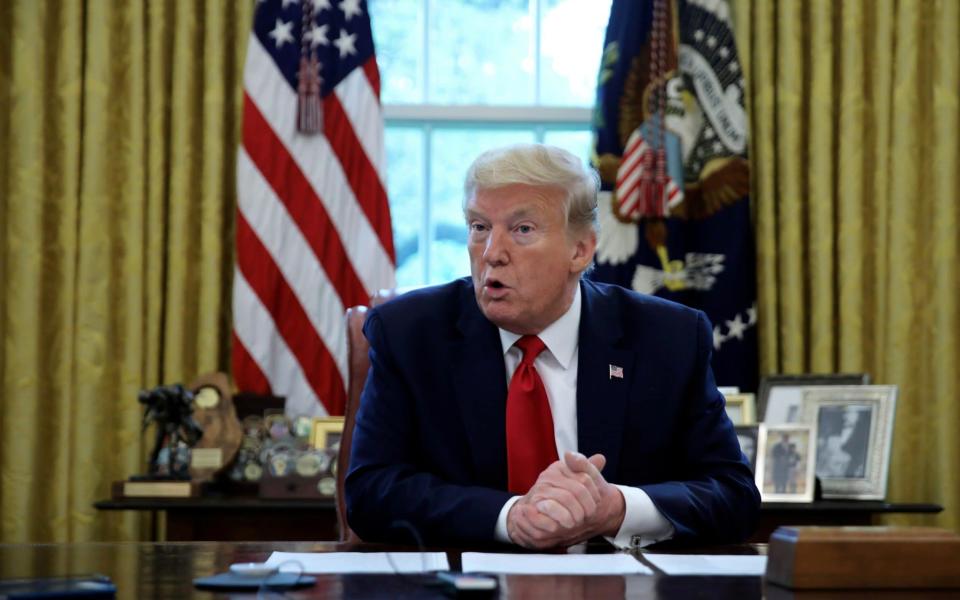Donald Trump says US will not extend coronavirus social-distancing guidelines

President Donald Trump says the federal government will not be extending its 30 Days to Slow the Spread coronavirus social-distancing guidelines once they expire on Thursday.
"They'll be fading out because now the governors are doing it," Mr Trump told reporters in the Oval Office as he met with John Bel Edwards, the Democratic governor of Louisiana.
Those guidelines - which were originally supposed to last 15 days and were then extended an additional 30 - encouraged Americans to work from home and avoid restaurants, group gatherings and discretionary travel and advised older people and those with serious underlying health conditions to isolate themselves.
Vice-President Mike Pence said the guidelines had been incorporated into the new guidance issued by the White House earlier this month that lays out how states can gradually ease restrictions and begin to reopen as the rate of new cases slows.
Meanwhile, Mr Trump plans to resume official travel with a trip to Arizona next week.
He said he was hoping to hold mass campaign rallies in coming months with thousands of supporters, even though medical experts have said there is little hope of having a vaccine by then.
Putting on a positive face on the latest grim numbers - the US death toll has now surpassed American lives lost in the Vietnam War - Mr Trump delivered his daily upbeat update.
His son-in-law and adviser, Jared Kushner, predicts that by July the country will be "really rocking again".
Mr Kushner described the administration's much-criticised response to the pandemic as a great success story.
Mr Trump talked up the good news the day provided: hopeful results for a possible Covid-19 treatment. But the government announced dismal new economic numbers as the pandemic took hold and shut down much of the country.
The White House has been trying to pivot to a new stage of the crisis, focused on efforts to reopen the nation's economy state by state amid concerns that lifting restrictions too quickly and without sufficient testing and contact tracing will spur a resurgence.
"We're heartened that the worst of the pain and suffering is going to be behind us," Mr Trump said as he led a roundtable with executives from companies like Hilton and Toyota.
He laid out a vision of a return to pre-coronavirus normalcy - "with or without" a vaccine - with packed restaurants and filled stadiums. That vision flies in the face of sober assessments from doctors who say the country will need to embrace a "new normal" that includes extended social distancing and wearing masks.
"I don't want people to get used to this," Mr Trump told reporters. "I see the new normal being what it was three months ago."
To underscore his confidence, Mr Trump announced that he plans to resume out-of-state travel after spending more than a month mostly cooped up in the White House.
He said he's planning a trip to Arizona next week, followed by a possible trip to Ohio, even as much of the country remains under effective lockdown with all but essential travel banned.
"We're going to start to move around and hopefully in the not-too-distant future, we'll have some massive rallies and people will be sitting next to each other," he said, adding that having people spaced out in accordance with social-distancing guidelines "wouldn't look too good".
He didn't say exactly when he envisioned such rallies returning, but said the timing would depend in part on the states, since some have had far fewer cases than others.
The federal government and most states have urged residents to avoid mass gatherings and to remain at least six feet apart.
Mr Kushner, who has been helping lead response efforts, said in an interview with Fox and Friends that he believes May will be a transition month and that, "by June, a lot of the country should be back to normal".
"The hope is that ... by July the country is really rocking again," he said.
"I think that we've achieved all the different milestones that are needed. So the federal government rose to the challenge, and this is a great success story."

 Yahoo News
Yahoo News 